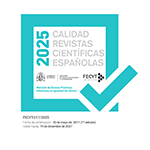Ruinas y legitimidad en Massinga. Formas de pensar el pasado entre ancianos empobrecidos del sur de Mozambique
Resumen
A partir del trabajo de campo etnográfico en el distrito de Massinga, en este artículo analizo la legitimidad de las autoridades tradicionales como un proceso de negociación que no puede desvincularse de la historia regional del África austral. Las transformaciones sociales producidas por el Estado colonial y la industria minera afectaron a las sociedades africanas. Los migrantes a las minas, excluidos de la modernidad en la que participaban, estaban a la vez dentro y fuera de dos procesos de reproducción social. Así, de entre los jóvenes proletarios de cada generación saldrían los futuros ancianos tradicionales. Esta posición ambigua se reflejaba en la construcción de casas cada vez más modernas, lo que, a su vez, contribuía a que cada nueva generación renovase la legitimidad de las instituciones tradicionales. Cuando los hombres perdieron la centralidad social que las minas les otorgaban, también perdieron la capacidad de renovar la legitimidad tradicional de sus instituciones.
Descargas
Descarga artículo
Licencia
La Revista de Antropología Social, para fomentar el intercambio global del conocimiento, facilita el acceso sin restricciones a sus contenidos desde el momento de su publicación en la presente edición electrónica, y por eso es una revista de acceso abierto. Los originales publicados en esta revista son propiedad de la Universidad Complutense de Madrid y es obligatorio citar su procedencia en cualquier reproducción total o parcial. Todos los contenidos se distribuyen bajo una licencia de uso y distribución Creative Commons Reconocimiento 4.0 (CC BY 4.0). Esta circunstancia ha de hacerse constar expresamente de esta forma cuando sea necesario. Puede consultar la versión informativa y el texto legal de la licencia.












